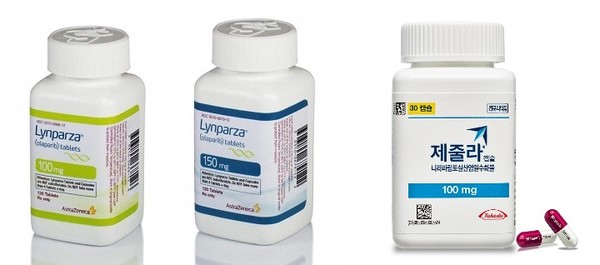AstraZeneca’s Lynparza tablet (ingredient: olaparib), a poly adenosine diphosphate-ribose polymerase (PARP) inhibitor, has become reimbursable for the first- and second-line maintenance therapy in ovarian cancer patients.
The anticancer drug shifted its form from capsule to tablet and obtained health insurance benefits simultaneously.

Takeda’s Zejula (niraparib), another PARP inhibitor, also got insurance benefits for the first-line maintenance therapy in ovarian cancer treatment, only for BRCA-mutated patients.
A majority of ovarian cancer patients, who have no BRCA mutation, still cannot use a PARP inhibitor.
On Tuesday, the Ministry of Health and Welfare’s Health Insurance Policy Deliberative Committee updated the list of reimbursable drugs and the table of maximum reimbursement rates. The revision takes effect from Oct. 1.
According to the revision, the government allowed PARP inhibitors to get insurance benefits for the first-line therapy in platinum-sensitive ovarian cancer patients.
So far, health insurance has covered PARP inhibitors only for the second or higher line maintenance therapy and the fourth or higher monotherapy.
Now, their reimbursement is available for the first-line maintenance therapy.
However, the criteria of BRCA mutation in all lines of treatment have remained unchanged.
AstraZeneca did not seek expanded reimbursement of the Lynparza capsule but pursued new reimbursement for the Lynparza tablet, which is more convenient to take.
Ovarian cancer patients used to take eight capsules of Lynparza 50 mg twice a day or 16 capsules daily. If they take newly reimbursable Lynparza 100 mg or Lynparza 150 mg, they can take four to six tablets daily.
With new insurance benefits, Lynparza is used as maintenance therapy for patients with advanced BRCA-mutated high-grade epithelial ovarian cancer, fallopian tube cancer, and primary peritoneal cancer who have responded (complete response or partial response) to first-line platinum-based therapy.
It can also be used as maintenance therapy for patients with reactive platinum-sensitive recurrent BRCA mutation high-grade epithelial ovarian cancer, fallopian tube cancer, and primary peritoneal cancer patients who responded to second or higher-line platinum-based therapy.
Lynparza is eligible for a risk-sharing agreement (RSA). Its health insurance benefits are based on RSA’s refund and expenditure cap system. The upper limits of the Lynparza tablet 100mg and 150mg were set at 38,842 won ($32.7) and 48,553 won per tablet, respectively.
Zejula also became reimbursable for maintenance therapy for patients with advanced BRCA-mutated epithelial ovarian cancer, fallopian tube cancer, and primary peritoneal cancer who responded to the first-line platinum-based treatment. Now, Zejula is covered by health insurance when used for the first and higher line maintenance therapy and fourth or higher line monotherapy.
Lynparza’s approval condition states that it should be used for BRCA-mutated patients in the first-line maintenance therapy. However, Zejula was authorized for “all-comers,” including those without BRCA mutation. Now, Zejula’s reimbursement became limited only for BRCA-mutated patients.
In Korea, about 15 to 20 percent of advanced ovarian patients are known to have BRCA mutation.
When Zejula was being developed, it drew attention because it proved a maintenance effect regardless of BRCA mutation. Patients had anticipated that it would meet the unmet demand of ovarian cancer patients without BRCA mutation.
However, most local ovarian patients find it challenging to use Zejula because of the limited reimbursement.
Zejula is also eligible for RSA’s expenditure cap system.
After the latest reimbursement updates, the upper limit of Zejula Capsule 100 mg price decreased by 6 percent from 74,184 won to 69,733 won per tablet.
Also, at the Tuesday meeting, the Health Insurance Policy Deliberative Committee granted insurance benefits for MSD’s HIV drugs Pipeltro (doravirine) and Delstrigo (doravirine/lamivudine/tenofovir disoproxil fumarate).
As alternative drugs of the two medicines exist, there will be no additional spending for the government. MSD accepted less than 90 percent of the weighted average price of alternative drugs, which led to recognizing the two drugs’ cost-effectiveness.
The government set the maximum prices of Pipeltro and Delstrigo at 7,975 won and 19,491 won, respectively, per tablet.

